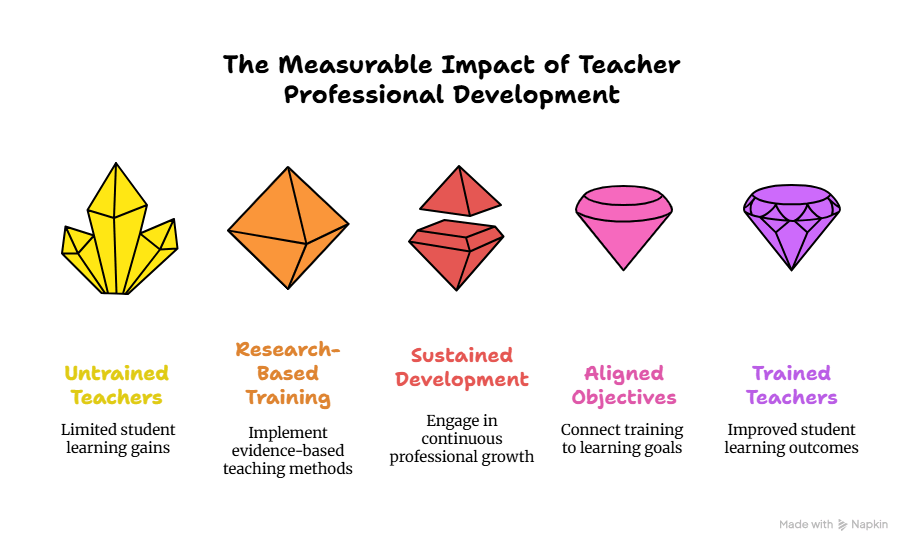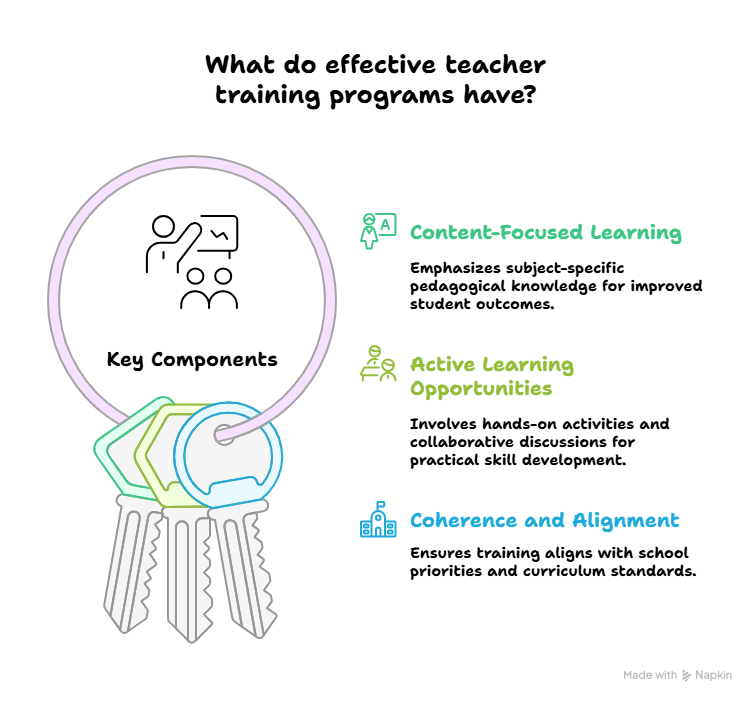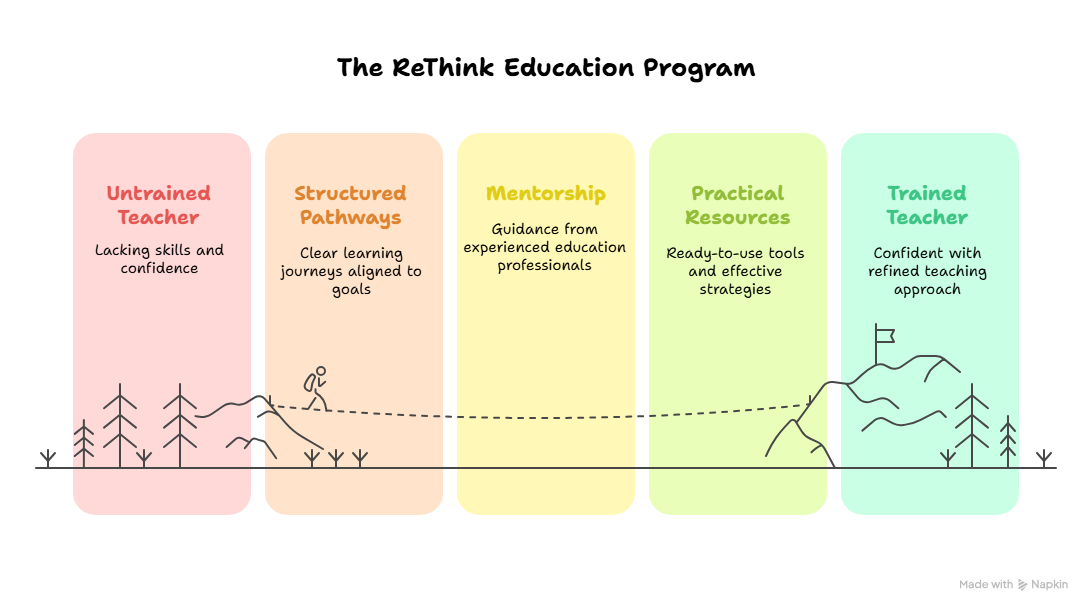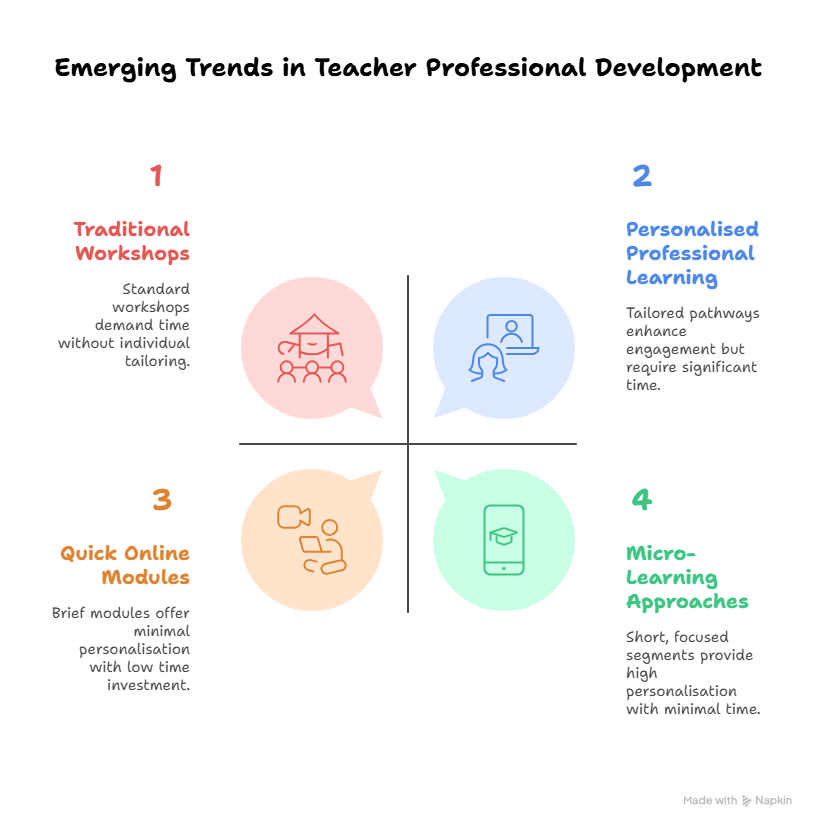Discover how professional development for teachers directly improves student learning outcomes. Evidence-based research on teacher training programmes and their measurable impact on educational success.

Evidence-Based Research and Real-World Impact
The relationship between teacher quality and student achievement has never been more scrutinised than it is today. Whilst educational policymakers and school leaders continuously seek strategies to improve academic performance, one factor consistently emerges as a critical determinant of success: professional development for teachers. Research demonstrates that well-designed teacher training programmes can significantly enhance student learning outcomes, creating a ripple effect that transforms entire educational communities.
Understanding the Connection Between Teacher Training and Student Success
Professional development for teachers encompasses far more than traditional one-off training sessions. Modern teacher training programmes represent comprehensive approaches to enhancing pedagogical skills, subject knowledge, and classroom management techniques. When educators engage in meaningful professional learning experiences, the benefits extend directly to their students through improved instructional practices and enhanced learning environments.
The impact of teacher training on student achievement operates through several interconnected mechanisms.
- Firstly, professional development enhances teachers’ content knowledge, enabling them to present complex concepts more effectively.
- Secondly, training in evidence-based teaching methodologies equips educators with proven strategies for engaging diverse learners.
- Finally, ongoing professional learning fosters reflective practice, encouraging teachers to continuously refine their approaches based on student needs and outcomes.
Research-Based Evidence: The Measurable Impact of Teacher Professional Development
Extensive research validates the profound influence of professional development for teachers on student learning outcomes. A comprehensive meta-analysis examining over 1,300 studies found that high-quality professional development programmes can increase student achievement by as much as 21 percentile points. These findings underscore the critical importance of investing in teacher training programmes that are research-based, sustained, and aligned with student learning objectives.
Studies consistently demonstrate that students taught by teachers who participate in intensive professional development programmes outperform their peers across multiple academic measures. In mathematics, for instance, students whose teachers completed specialised training showed gains equivalent to an additional 2-3 months of learning compared to control groups. Similarly, literacy outcomes improved significantly when teachers engaged in comprehensive reading instruction professional development.
The duration and intensity of teacher training programmes significantly influence their effectiveness. Research indicates that professional development initiatives lasting fewer than 14 hours show minimal impact on student achievement. Conversely, programmes extending beyond 50 hours of training demonstrate substantial improvements in both teacher practice and student outcomes. This evidence highlights the importance of sustained, comprehensive approaches to educator professional learning.
For educators seeking comprehensive professional development that meets these research-backed criteria, programmes like the ReThink Education Certification Program offer 58 hours of blended learning over three months, covering essential 21st-century teaching skills from UbD Framework to AI tools for teaching and learning.
Key Components of Effective Teacher Training Programmes
Successful teacher training programmes share several essential characteristics that maximise their impact on student learning outcomes. Understanding these components enables educational leaders to design and implement professional development initiatives that deliver measurable results.
Content-Focused Learning forms the foundation of effective professional development. Training programmes that concentrate on specific subject matter and pedagogical content knowledge produce the most significant improvements in student achievement. Rather than generic teaching strategies, successful initiatives focus on how to teach particular concepts within specific disciplines, addressing the unique challenges educators face in their subject areas.
Active Learning Opportunities distinguish high-impact professional development from passive training experiences. Effective programmes engage teachers in hands-on activities, collaborative problem-solving, and reflective discussions. These interactive elements enable educators to practice new techniques, receive feedback, and adapt strategies to their unique classroom contexts.
Coherence and Alignment ensure that professional development for teachers initiatives complement existing school improvement efforts and curriculum requirements. Training programmes that align with school priorities, standards, and assessment systems demonstrate greater impact on student learning outcomes than isolated professional development activities.

The Role of Online Professional Development for Educators
The digital transformation of education has revolutionised professional learning opportunities for teachers. Online professional development for educators offers unprecedented flexibility and accessibility, enabling teachers to engage in high-quality training regardless of geographical constraints or scheduling limitations. Research indicates that well-designed online professional development programmes can be equally effective as face-to-face training when they incorporate interactive elements and sustained support.
Digital professional development platforms provide several advantages that enhance their impact on student learning outcomes. Personalised learning paths allow teachers to focus on specific areas of need, whilst multimedia resources accommodate diverse learning preferences. Additionally, online communities of practice foster ongoing collaboration and support, extending the benefits of professional development beyond formal training sessions.
However, the effectiveness of online professional development for educators depends significantly on programme design and implementation. Successful digital training initiatives incorporate regular interaction with instructors and peers, provide opportunities for practical application, and offer ongoing support for implementation. These elements ensure that online professional development translates into improved classroom practice and enhanced student learning outcomes.
Transform Your Teaching Practice with Comprehensive Professional Development
Ready to make a measurable impact on student learning outcomes? Join thousands of educators who have enhanced their teaching effectiveness through evidence-based professional development programmes.
Explore ReThink Education Certification Program
3 month comprehensive program | 58 hours of learning | Live instructor-led training | 8 Modules with Optional Capstone Project to Build Your Portfolio!

Measuring and Evaluating the Impact of Professional Development For Teachers
Assessing the effectiveness of teachers professional development requires comprehensive evaluation strategies that examine both immediate and long-term outcomes. Effective measurement approaches consider multiple indicators of success, including changes in teacher knowledge and skills, improvements in instructional practice, and most importantly, enhanced student learning outcomes.
Classroom observation protocols provide valuable insights into how professional development influences teaching practice. Trained observers can document changes in instructional strategies, student engagement levels, and the implementation of newly acquired techniques. These observations offer concrete evidence of professional development impact whilst identifying areas for continued growth and support. Effective observation frameworks can be found through various educational authorities.
Student achievement data serves as the ultimate measure of professional development success. Effective evaluation strategies examine various academic indicators, including standardised test scores, formative assessment results, and authentic performance measures. By analysing student data before and after professional development interventions, educational leaders can quantify the impact of teacher training programmes on learning outcomes.
Overcoming Common Barriers of Effective Professional Development For Teachers
Despite the proven benefits of quality teacher training, numerous obstacles can impede the successful implementation of professional development programmes. Understanding and addressing these challenges is essential for maximising the impact of professional learning initiatives on student outcomes.
Time Constraints represent one of the most significant barriers to effective professional development. Teachers often struggle to balance professional learning commitments with their existing responsibilities, leading to surface-level engagement or incomplete programme participation. Successful schools address this challenge by providing adequate time for professional development within the regular schedule and recognising that meaningful change requires sustained effort over time. The Department for Education guidance offers strategies for managing teacher workload effectively.
Lack of Follow-Up Support frequently undermines the potential impact of professional development initiatives. Without ongoing coaching, mentoring, or collaborative support, teachers may struggle to implement new strategies effectively. High-impact programmes incorporate structured follow-up activities, peer observation opportunities, and regular check-ins to ensure successful implementation of newly acquired skills.
Future Directions: Emerging Trends in Teacher Professional Development
The landscape of professional development for teachers continues to evolve, incorporating innovative approaches that promise to enhance impact on student learning outcomes. Understanding these emerging trends enables educational leaders to design forward-thinking professional development strategies that address contemporary challenges whilst building capacity for future success.
Personalised Professional Learning represents a significant shift from one-size-fits-all training approaches. Advanced analytics and assessment tools enable the creation of individualised professional development pathways that address specific teacher needs and interests. This personalisation increases engagement and relevance, ultimately enhancing the transfer of learning to classroom practice. Platforms like Suraasa and Firki offer personalised learning opportunities.
Micro-Learning Approaches break complex professional development content into digestible, focused segments that can be completed in short time periods. This format accommodates busy teacher schedules whilst promoting better retention and application of new concepts. Research suggests that micro-learning can be particularly effective when combined with spaced repetition and practical application opportunities. Professional learning platforms increasingly offer micro-learning modules designed specifically for educators.

Building a Culture of Continuous Professional Learning
Creating sustainable improvements in student learning outcomes through professional development requires establishing a school culture that values and supports continuous learning. This cultural transformation extends beyond individual professional development activities to encompass systemic changes in how schools approach teacher growth and development.
Collaborative Learning Communities foster environments where teachers regularly share expertise, observe each other’s practice, and engage in professional dialogue about student learning. These communities amplify the impact of formal professional development by creating ongoing opportunities for peer learning and support. Research demonstrates that schools with strong collaborative cultures show greater improvements in student achievement following professional development initiatives. The Teaching School model in England exemplifies this collaborative approach.
Leadership Support plays a crucial role in determining the success of professional development programmes. School leaders who actively participate in professional learning, provide necessary resources, and maintain high expectations for implementation create conditions that maximise the impact on student outcomes. Effective leaders also ensure that professional development aligns with school improvement goals and receives adequate time and attention. The National College for Teaching and Leadership provides resources for developing effective educational leadership.
Conclusion: Investing in Teacher Growth for Student Success
The evidence is unequivocal: high-quality professional development for teachers represents one of the most powerful strategies for improving student learning outcomes. When schools invest in comprehensive, sustained, and research-based teacher training programmes, the benefits extend far beyond individual classrooms to transform entire educational communities.
Successful professional development initiatives share common characteristics: they focus on specific content and pedagogical knowledge, provide active learning opportunities, maintain coherence with school goals, and include ongoing support for implementation. Whether delivered through traditional face-to-face formats or innovative online professional development for educators, these programmes must prioritise quality and sustainability to achieve meaningful impact.
As educational systems worldwide grapple with increasing demands for accountability and improved student outcomes, professional development emerges as a critical investment in future success. Schools that embrace comprehensive approaches to teacher training, supported by strong leadership and collaborative cultures, position themselves to achieve sustained improvements in student learning outcomes. The question is not whether to invest in professional development, but rather how to design and implement programmes that maximise their transformative potential for both teachers and students.
The journey towards educational excellence requires a commitment to continuous learning and improvement. By prioritising high-quality professional development opportunities, educational leaders can create positive change that benefits teachers, students, and entire school communities for generations to come. For more resources on professional development opportunities, visit the Chartered College of Teaching or explore CPD certification programmes available to educators.
Modern educational challenges require innovative solutions backed by research and practical application. At Ekya Professional Development Institute, we understand that effective teacher training programmes must combine theoretical knowledge with hands-on practice, mentorship with independence, and traditional pedagogy with cutting-edge technology to truly transform student learning outcomes.
